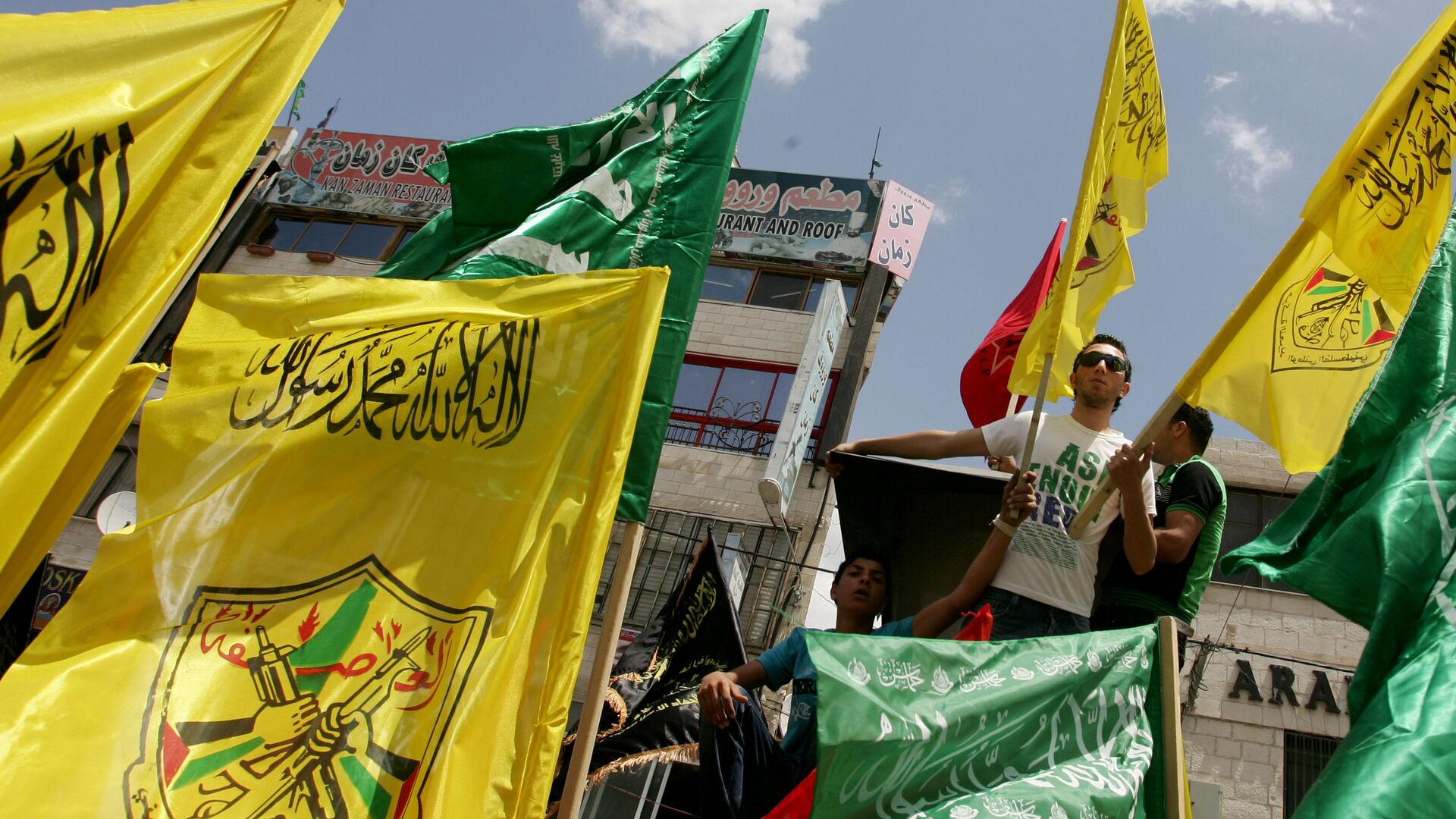https://sputnikglobe.com/20220520/almost-a-decade-after-historic-fatah-hamas-reconciliation-truce-still-nowhere-in-sight-1095649789.html
Almost a Decade After Historic Fatah-Hamas Reconciliation, Truce Still Nowhere in Sight
Almost a Decade After Historic Fatah-Hamas Reconciliation, Truce Still Nowhere in Sight
Sputnik International
Throughout the years, innumerable efforts have been made to settle the differences between the two Palestinian factions - Fatah and Hamas - that have been at... 20.05.2022, Sputnik International
2022-05-20T06:35+0000
2022-05-20T06:35+0000
2022-05-20T06:35+0000
palestinians
gaza strip
west bank
https://cdn1.img.sputnikglobe.com/img/104747/55/1047475521_0:135:3000:1823_1920x0_80_0_0_878a7f8b341bd3626653ca34e88a9fbc.jpg
It has been eight years since Hamas - which rules the Gaza Strip - and Fatah (which is in control of the West Bank) sealed a reconciliation deal in June 2014 that paved the way for a joint government to be established.The goals of that Union Government were simple: assuming responsibilities in the Gaza Strip, from which Fatah was expelled in 2007 when Hamas took over in a violent coup; reactivating the work of the Palestinian Legislative Council; and implementing the 2006 National Conciliation Document to establish an independent Palestinian state.Failed ReconciliationAlthough expectations were high, Elias Zananiri, a senior Palestinian Liberation Organisation and Fatah member, says the reconciliation pact didn't hold water for the simple reason that Hamas refused to implement its agreements with Fatah.Almost a decade down the line, the two main Palestinian factions are still at odds with each other: whereas Fatah has taken a more accommodating approach towards Israel, Hamas has stuck to its Islamist ideology, rejecting Israel and lambasting the Palestinian Authority for cooperating with what it calls the enemy.Truce Nowhere in SightThroughout the years, all sorts of mediators have tried to bridge the gap between the two rivals. Several rounds of negotiations have taken place in Egypt, Turkey and Algeria. Plans have been laid out, intentions have been specified. But progress has been almost non-existent.Zananiri says change is unlikely any time soon since Hamas is inclined even more towards the "more radical forces" in the Middle East, namely Qatar and Iran.However, despite the gloomy prognosis, Zananiri believes a breakthrough is still possible.
gaza strip
west bank
Sputnik International
feedback@sputniknews.com
+74956456601
MIA „Rosiya Segodnya“
2022
News
en_EN
Sputnik International
feedback@sputniknews.com
+74956456601
MIA „Rosiya Segodnya“
Sputnik International
feedback@sputniknews.com
+74956456601
MIA „Rosiya Segodnya“
palestinians, gaza strip, west bank
palestinians, gaza strip, west bank
Almost a Decade After Historic Fatah-Hamas Reconciliation, Truce Still Nowhere in Sight
Throughout the years, innumerable efforts have been made to settle the differences between the two Palestinian factions - Fatah and Hamas - that have been at odds with each other despite agreeing to establish a unity government. Talks have been held in Egypt, Turkey and Algeria but so far to no avail.
It has been eight years since Hamas - which rules the Gaza Strip - and Fatah (which is in control of the West Bank) sealed a reconciliation deal in June 2014 that paved the way for a joint government to be established.
The goals of that Union Government were simple: assuming responsibilities in the Gaza Strip, from which Fatah was expelled in 2007 when Hamas took over in a violent coup; reactivating the work of the Palestinian Legislative Council; and implementing the 2006 National Conciliation Document to establish an independent Palestinian state.
Although expectations were high, Elias Zananiri, a senior Palestinian Liberation Organisation and Fatah member, says the reconciliation pact didn't hold water for the simple reason that Hamas refused to implement its agreements with Fatah.
"Hamas refused to enable the Palestinian Authority government to return and function in the Gaza Strip the same way it did in the West Bank," he said. "It thought it would use the Palestinian Authority as its ATM from which Hamas could withdraw funds without giving any powers in return. [But] that didn’t work."
Almost a decade down the line, the two main Palestinian factions are still at odds with each other: whereas Fatah has taken a more accommodating approach towards Israel, Hamas has stuck to its Islamist ideology, rejecting Israel and lambasting the Palestinian Authority for cooperating with what it calls the enemy.
Throughout the years, all sorts of mediators have tried to bridge the gap between the two rivals. Several rounds of negotiations have taken place in Egypt, Turkey and Algeria. Plans have been laid out, intentions have
been specified. But progress has been
almost non-existent.
Zananiri says change is unlikely any time soon since Hamas is inclined even more towards the "more radical forces" in the Middle East, namely Qatar and Iran.
"In the past, some believed that Hamas would become more moderate because it was close to Turkey, but that didn't happen. Now it is almost persona non grata in Turkey [after its rapprochement with Israel], so the only escape route left for Hamas is to stick with Iran. The problem is that the closer Hamas gets to Iran, the further it is from a peace deal with Israel, or a national reconciliation with the Palestinian Liberation Organisation and Fatah."
However, despite the gloomy prognosis, Zananiri believes a breakthrough is still possible.
"Under the surface, changes are taking place within Hamas. So who knows, maybe one day the sane and moderate leadership in the movement will take over. If that does happen, we will manage to get out of this quagmire of a split between the West Bank and the Gaza Strip."



